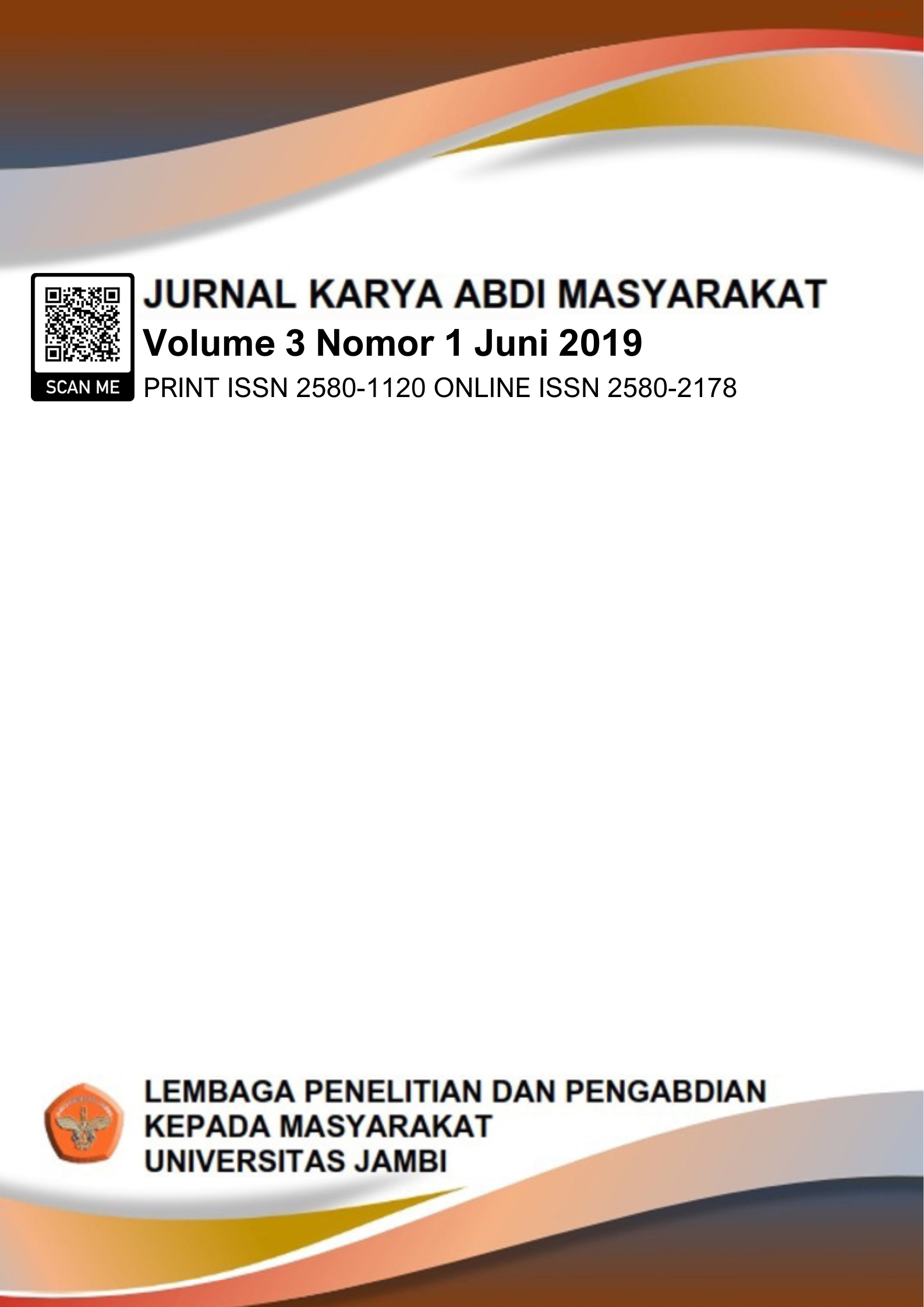PPM Kelompok Tani Kecamatan Betara : Aplikasi Teknologi Pupuk Organik Mikotriderm Dalam Penerapan Good Agricultural Practices Pada Budidaya Kopi Liberika Tungkal Jambi
DOI:
https://doi.org/10.22437/jkam.v3i1.7004Keywords:
Libtujam, Mikoriza, Mikotriderm, TrichokomposAbstract
Kecamatan Betara yang menjadi target PEMDA dalam menerapkan Program Bangkit yang merupakan program penanaman kembali tanaman-tanaman yang dahulu adalah tanaman dominan namun produksinya sudah menurun. Untuk Kecamatan Betara, tanaman kopi liberika Tungkal Jambi termasuk tanaman yang diprioritaskan karena merupakan tanaman utama yang ditumpangsari dengan tanaman pinang. Kegiatan Pengabdian Kepada Masyarakat akan dilaksanakan di Kelurahan Mekar Jaya yang merupakan kawasan sentra tanaman kopi, namun produksinya terus menurun karena tanaman tidak dirawat serta serangan penyakit terutama penyakit akar (jamur akar). Ipteks yang dilaksanakan adalah penerapan Sistem budidaya perkebunan kopi yang baik (GAP) dan berkelanjutan (sustainable coffee production) yang merupakan inovasi baru dalam bisnis budidaya kopi liberika Tungkal Jambi. Petani belum mengetahui bagaimana cara menerapkan Sistem budidaya perkebunan kopi yang baik dan berkelanjutan (sustainable coffee production) atau dikenal dengan istilah Good Agricultural Practices (GAP). GAP merupakan sebuah pedoman pelaksanaan budidaya tanaman. Penerapan GAP mencerminkan tiga pilar keberlanjutan yaitu layak secara ekonomi, ramah lingkungan, dan diterima oleh masyarakat, termasuk keamanan dan kualitas pangan. Penerapan GAP serta dengan memanfaatkan peranan mikroorganime (Trichoderma sp) dapat meningkatkan ketahanan tanaman terhadap penyakit (induksi ketahanan) sehingga dapat meningkatkan produktivitas tanaman. Mikoriza dapat digunakan sebagai komponen pengendali hama dan patogen akar. Respon dari mitra sangat positif, di mana mitra memberikan antusias dan mau menerima inovasi teknologi yang diberikan serta memiliki minat yang tinggi dan bersedia untuk menerapkan teknologi yang diberikan.
Downloads
References
Badan Penelitian dan Pengembangan Pertanian. 2008.
Teknologi Budidaya Kopi Poliklonal. Balai Besar Pengkajian dan Pengembangan Teknologi Pertanian.
Hulupi R, Martini E. 2013. Pedoman Budidaya dan Pemeliharaan Tanaman Kopi di Kebun Campuran. Bogor, Indonesia: World Agroforestry Centre (ICRAF) Southeast Asia Regional Program.
Masyarakat Perlindungan Indikasi Geografis. 2014. Buku Persyaratan Indikasi Geografis Kopi Tungkal Jambi. BPTP Jambi.Jambi.
Neely, C., B. Haight., J. Dixon., A. S. Poissot. 2007. Report of the FAO Expert Consultation on a Good Agricultural Practice Approach. Food and agriculture organization of United Nation. Rome. 27 p. (http : // www. fao.org/prods/gap/Docs/PDF/1-reportExpertConsultation XTERNAL.pdf).
Pusat Penelitian Kopi dan Kakao Indonesia. 2006. Pedoman Teknis Tanaman Kopi. Jember.
Downloads
Published
Versions
- 2019-06-21 (1)
- 2019-06-21 (1)
How to Cite
Issue
Section
License
Please find the rights and licenses in Jurnal Jurnal Karya Abdi Masyarakat (JKAM).
- License
The non-commercial use of the article will be governed by the Creative Commons Attribution license as currently displayed on Creative Commons Attribution 4.0 International License.
- Authors Warranties
The author warrants that the article is original, written by stated author(s), has not been published before, contains no unlawful statements, does not infringe the rights of others, is subject to copyright that is vested exclusively in the author and free of any third party rights, and that any necessary written permissions to quote from other sources have been obtained by the author(s).
- User Rights
JKAM's spirit is to disseminate articles published are as free as possible. Under the Creative Commons license, JKAM permits users to copy, distribute, display, and perform the work for non-commercial purposes only. Users will also need to attribute authors and JKAM on distributing works in the journal.
- Rights of Authors
Authors retain the following rights:
- Copyright, and other proprietary rights relating to the article, such as patent rights,
- The right to use the substance of the article in future own works, including lectures and books,
- The right to reproduce the article for own purposes, provided the copies are not offered for sale,
- The right to self-archive the article.
- Co-Authorship
If the article was jointly prepared by other authors, the signatory of this form warrants that he/she has been authorized by all co-authors to sign this agreement on their behalf, and agrees to inform his/her co-authors of the terms of this agreement.
- Termination
This agreement can be terminated by the author or JKAM upon two months notice where the other party has materially breached this agreement and failed to remedy such breach within a month of being given the terminating party notice requesting such breach to be remedied. No breach or violation of this agreement will cause this agreement or any license granted in it to terminate automatically or affect the definition of JKAM.
- Royalties
This agreement entitles the author to no royalties or other fees. To such extent as legally permissible, the author waives his or her right to collect royalties relative to the article in respect of any use of the article by JKAM or its sublicensee.
- Miscellaneous
JKAM will publish the article (or have it published) in the journal if the articles editorial process is successfully completed and JKAM or its sublicensee has become obligated to have the article published. JKAM may conform the article to a style of punctuation, spelling, capitalization, referencing and usage that it deems appropriate. The author acknowledges that the article may be published so that it will be publicly accessible and such access will be free of charge for the readers.














